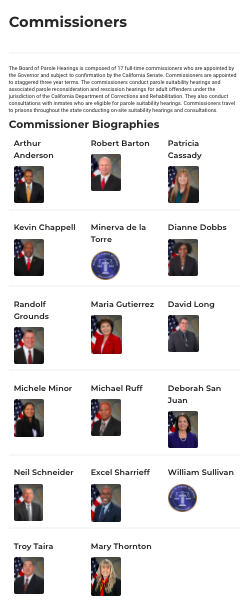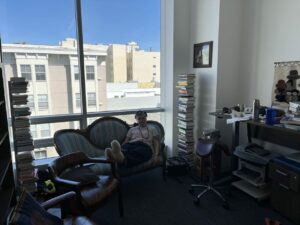
This morning I’m scheduled to testify before the Senate Public Safety Committee in support of AB 1210 (Ting). The proposition is to diversify the parole board by including commissioners with a variety of professional backgrounds, including therapeutic backgrounds.
Those of you who read Yesterday’s Monsters may recall that, while the Board is diverse in terms of race and gender, it is not diverse in terms of professional background. The vast majority of commissioners come from law enforcement backgrounds: former sheriffs, police chiefs, and correctional officers. This has far-reaching implications as to the nature and result of the hearings.
The current composition of the board dates back to several transformations in California punishment that happened throughout the late 1970s and 1980s. Over the years, the time before the initial hearing and between hearings increased; actuarial risk assessment replaced correctional counselors and psychologists; the role of prosecutors and victim supporters vastly increased; and voters approved a gubernatorial veto on parole board decisions to release. Despite repeated instruction from the California Supreme Court to focus on future prospects and risks, the Board acts defensively, finding ways to bypass this requirement and deny parole on the basis of crimes that happened decades ago—even to people who, according to vast criminological research, have long ago aged out of crime. As a consequence, recommendations for release are rare, accounting for only 16-17% of all hearings.
It is unsurprising that a group comprised almost exclusively of law enforcement officers is professionally and culturally predisposed to accept court records and disciplinary write-ups as incontrovertible truth, makes biased assumptions about people from their demeanor and body language, and tends to accept simplistic narratives at the expense of more complicated stories involving people’s environment and circumstances. The commissioners also exhibit complacency regarding the woeful inadequacies of our prison programming system, laying the blame for inaccessible or nonexisting rehabilitation programs on the parole applicants themselves. Despite some continuing education workshops, the commissioners as a group do not possess deep professional knowledge on issues such as substance abuse and mental health.
The commissioners regularly pride themselves for being able to detect false remorse or lack of insight. Unfortunately, this self-assessment claim is contradicted by robust empirical research. In experiments, law enforcement officers regularly express significantly more certainty about their ability to detect lies–and regularly do significantly WORSE than general population in telling truth and lies apart.
We are at a unique moment in history, in which we acknowledge that multiple forms of wisdom and expertise—not only the expertise of law enforcement officers—are essential to solve social problems and offer hope to families and communities. Tune in to the hearing today and make your voice heard in support of this important change.




No comment yet, add your voice below!